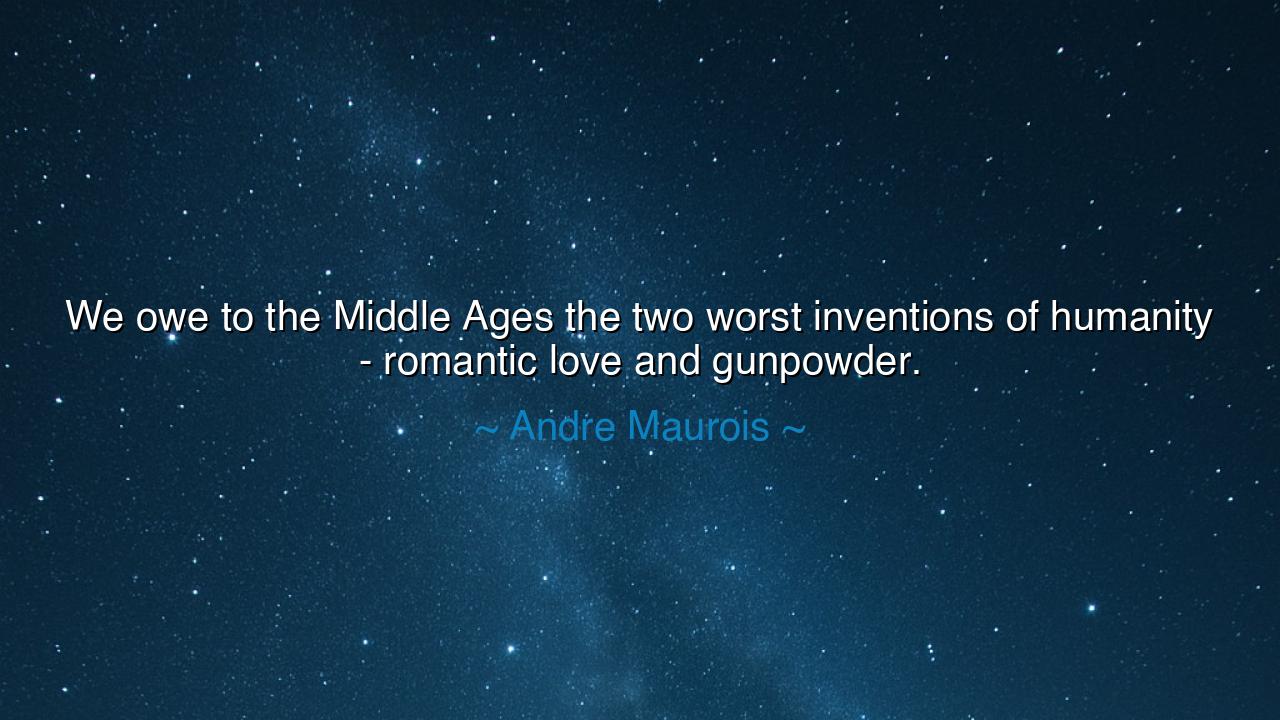
We owe to the Middle Ages the two worst inventions of humanity -
We owe to the Middle Ages the two worst inventions of humanity - romantic love and gunpowder.






“We owe to the Middle Ages the two worst inventions of humanity — romantic love and gunpowder.” — André Maurois
In this bold and paradoxical saying, André Maurois, the French novelist and moral philosopher, casts a wry yet profound eye upon the contradictions of the human spirit. His words, though delivered with wit, contain a deep reflection on how civilization often forges its greatest dangers from its highest aspirations. Romantic love and gunpowder — one born of the heart, the other of the forge — both emerged from the Middle Ages, that turbulent cradle of chivalry, faith, and fire. One destroys the body, the other torments the soul; one brings nations to their knees, the other makes individuals tremble. In this dual invention of passion and power, Maurois finds the two edges of the same sword — both noble, both perilous, both profoundly human.
The origin of this saying lies in Maurois’s fascination with history and human psychology. The Middle Ages, he suggests, were an era of invention not only in technology but in emotion — an age when both the machinery of war and the machinery of the heart were refined to unprecedented intensity. Gunpowder, introduced from the East, transformed battlefields forever. The knight’s sword, once a symbol of personal honor, was rendered meaningless before the faceless thunder of the cannon. Meanwhile, romantic love, elevated by troubadours and poets, turned desire into worship, and affection into obsession. Together they mark a turning point — the dawn of a world ruled as much by passion as by power.
But Maurois’s insight cuts deeper still. He calls them the worst inventions not because they are evil in themselves, but because they reveal how the gifts of the mind can become the torments of the soul. Gunpowder was meant to empower kings, yet it multiplied destruction; love was meant to ennoble the spirit, yet it often enslaves it. From both spring the same paradox: that what begins as creation can become catastrophe. The philosopher’s tone is not despairing, but ironic — as if to say, “Behold the ingenuity of mankind: we invent both beauty and ruin in the same breath.”
The ancients, who lived before both these inventions, might have understood this truth instinctively. They knew love as affection, loyalty, or divine harmony, but not yet as the burning ideal of romantic passion. For the Greeks, love (eros) was a force both sacred and dangerous — a madness sent by the gods, beautiful but feared. The medieval poets took that divine flame and bound it to courtly ritual, teaching knights to love their ladies with the same fervor they served their lords. In so doing, they gave birth to romantic love — not merely an emotion, but an ideal, one that would shape art, poetry, and heartbreak for centuries to come. Thus, the same age that forged cathedrals of stone also built cathedrals of longing, within the human heart.
Likewise, gunpowder changed not only the art of war, but the very soul of humanity. Before its coming, combat was bound by ritual, courage, and the measure of the man who wielded the sword. With the advent of the cannon and musket, distance replaced honor, and death came not from skill but from chemistry. Battles once decided by valor became spectacles of noise and annihilation. The Chinese, who first discovered gunpowder’s power, called it fire medicine — meant for fireworks and healing rituals. Yet in Europe, it became the alchemy of destruction. So Maurois, in his sardonic wisdom, pairs it with love: both began as beauty, both ended as suffering.
There is in this pairing a mirror — for love and war are twin fires. Both stir the blood, both demand surrender, and both can consume what they were meant to protect. The poets of old saw this too. “All’s fair in love and war,” wrote one, for both obey no law but their own. From Helen of Troy, whose beauty launched a thousand ships, to Napoleon, whose cannons reshaped nations, history itself is written in the ink of these two inventions. The sword of passion and the powder of ambition — both born in the heart of man — have together forged the destiny of civilizations.
And yet, my child, let us not despise these inventions, but understand them. For in both lies the same lesson: that power without wisdom destroys its wielder. Love is not evil when tempered by truth, nor is invention wicked when guided by conscience. The fault lies not in the tools, but in the hands that wield them. If the Middle Ages gave us passion and gunpowder, let the modern age give us restraint and compassion. Let us learn to love without consuming, to create without conquering, to kindle light without fire.
So, remember this teaching: every gift of humanity carries its shadow. The heart that can love deeply can also wound deeply; the mind that can create wonders can also unleash ruin. Walk, therefore, with awareness and humility. Do not extinguish passion, but govern it. Do not fear progress, but guide it. For the same spirit that invented romantic love and gunpowder also holds the power to build peace, to heal, and to forgive. And that, perhaps, is the final redemption of our strange and wondrous human age.






AAdministratorAdministrator
Welcome, honored guests. Please leave a comment, we will respond soon